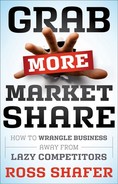Buy Your Competition at Garage Sale Prices
It is contrarian thinking to spend hard-won money (i.e., to expand) during an economic downturn. But spending money the right way can sometimes be your best source for growth. Organizations that hoard their cash and play it safe during a recovery are, in my opinion, wasting a good recession—especially when there are so many underpriced bargains to be had.
Want to grow your market share? Sometimes the answer is to simply buy your competition . . . on sale.
I have always loved this quote from Baron Rothschild (of the Rothschild banking family): “The time to buy is when there is blood in the streets.” New York mayor and famed financier Michael Bloomberg puts it this way: “I always try to look ahead and avoid the rearview mirror.”
My history buff friend (turned stock broker), Jeff Mash, reminded me of this Benjamin Franklin quote: “Buy low. Sell High. I know of no more reliable path to profit.”
Now is probably the time for you to buy rather than hoard. Consider the Boston Consulting Group's 1985–2000 recession studies, which stated that “average mergers in a downturn created an 8.3 percent rise in shareholder value after two years, while the average merger in good times dropped 6.2 percent within the two years following.”
A McGraw-Hill Research study of the 1980–1985 recession came to a similar conclusion: “[The] 600 companies who increased advertising expenditures during the 1981–1982 recession significantly experienced higher sales growth, both during the recession and for three years following. Those companies rose 265 percent over those that didn't keep up their advertising.”
Do you think it can't happen in your industry? Take a peek at the diverse examples that follow.
Bank Bargains
Wells Fargo drooled at the bargain it saw. In the midst of the recession, Wells Fargo bought the best of Wachovia Bank for a paltry $45 billion, and its profits in 2009 surged 362 percent. Earnings bounced over $12 billion, making Wells Fargo CEO John Stumpf America's highest-paid banker ($21 million in his total compensation package in 2009).
In Canada, the lending laws still require home buyers to put a substantial amount of their own money down on a house—and to verify they have the income to afford the mortgage payment. (Novel approach, isn't it?) Because of these controls, Toronto Dominion Bank sidestepped the toxic subprime mortgage market and has since gobbled up 1,000 bank branches from Maine to Florida. Toronto Dominion is anxious to get your business. It is open 7 days a week, 361 days a year, and is eager to sell you a mortgage.
Retail Domination
Consider, as well, the case of Toys “R” Us. It was already a global retail toy giant when the recession made the brand even more aggressive. Much like Best Buy's customer obsession short-circuited Circuit City, Toys “R” Us targeted competitor KB Toys for extinction—and pulled it off. By 2008, KB shut down 461 stores, leaving Toys “R” Us the undisputed leader in its category, with $13 billion in worldwide sales.
But Toys “R” Us didn't stop there. Determined to gain world retail toy domination, the company bought FAO Schwartz to acquire a premium brand, and it also purchased eToys in order to establish a stronger Internet presence.
Betting On Professional Athletics
In the major league sports arena, ESPN has to be applauded for paying attention to the public consciousness and for spending money before reaping the rewards. In 2005, ESPN spent $100 million for the FIFA World Cup soccer TV rights. It predicted that the massive millennial audience who grew up playing soccer would be eager to tune in to the games, and the network also paid attention to the growing Latino population in America. ESPN's bet paid off, as its viewership of World Cup soccer doubled between 2006 and 2010.
The Next Energy
Of course, I cannot leave out an energy company that took advantage of recession-induced deals. In April 2009, Valero Energy, oil refiners and operators of Valero and Diamond Shamrock gas stations, bid on seven bankrupt ethanol plants owned by VeraSun (the nation's second-largest ethanol producer). While the price tag of $447 million may seem like a lot of cash, Valero paid only 30 cents on the dollar.
It won't take long for Valero to start getting a fat return on its investment. Congress has mandated doubling the use of corn ethanol to 15 billion gallons by 2015.
The lesson here is simple: Bad timing for some companies can sometimes mean stunning profits for others.
An Automaker Outfoxes Itself
General Motors was a true contrarian thinker when it produced the EV1 electric car from 1996 through 1999. No other automaker went after this market with such zeal. However, GM discontinued production in 2002.
With energy and environmental concerns gaining in popularity since 2002, my longtime friend Bill Nye (of Bill Nye the Science Guy fame) tells me that General Motors picked the exact wrong time in history to stop producing the electric car. Bill drove (and enjoyed) the car for two years until GM wanted it back. While some fans believe General Motors stopped production because maintaining a parts inventory would be cost-prohibitive, GM claims that only 800 units were leased, which clearly did not generate enough income, considering that GM had invested $1 billion in the project.
Much like Kodak, which had invented digital photography and then watched its competitors bask in the market share victories, GM has had to sit back and watch Honda sell 610,000 hybrids worldwide. GM is probably even angrier to see Toyota gloat over the 690,000 units it sold last year.
If you have the nerve to be a contrarian, then stand tall and have the courage of your convictions. It's the curse—and glory—of all forward-thinking contrarians.
